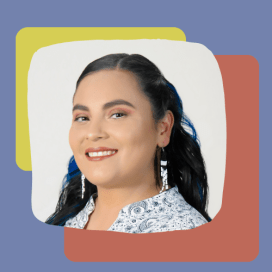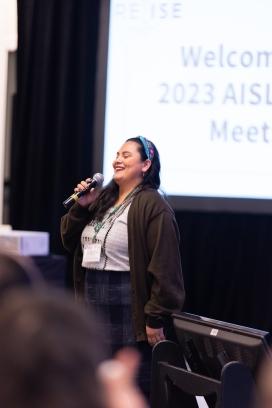Meet REVISE: Selene Gonzalez-Carrillo
"REVISE should provide the spaces for folks to go in, navigate what they’re lacking and have a dialogue with us and each other. We want to help them feel empowered so they can make the choices themselves to change. It should be natural. It's not up to us. We're not making decisions, but we're doing our part in the ISE environment to make it more equitable and a fair playing field."

We are excited to share our interview with Selene Gonzalez-Carrillo, the Communities of Practice coordinator for the REVISE team.
What drew you to STEM? To informal science?
I always enjoyed science classes in high school, but as a first-generation immigrant who entered the country at the age of 5 years old, I was always playing catch up in school. I still remember how proud I was when I finally made it my first ALL English class in the 4th grade. I loved my science courses in high school, especially physics, but I quickly realized during my first year of college that enjoyment was not enough in the high paced world of STEM education. It was heartbreaking for me, because I was playing catch up again, but this time the pace was fast, too fast, for the way I learned and where I was in my life. So I let it go.
Then I walked into my first environmental studies course and found my way back into science after my professor said that the human loss of Hurricane Katrina could have been avoided. I made the decision then to go into environmental work and the more political, sociological aspects of science. When I graduated from college I landed my first job as a Wetland Technician and experienced firsthand how much capitalist interest had influenced this field where I was working, to the point where we were just maintaining wetlands so that they were merely complying with watered-down EPA policy. We weren't doing anything to really help Wetlands flourish–we were just trying to make sure everybody was legally compliant. I realized, “Okay, I can't work in a field where I am just complacent. It’s destructive, just to make sure we follow some law that humans put in place, and we could argue whether it's even good enough.”
"I liked working with people, connecting with them and having our collective efforts lead towards social change. I liked this feeling, every day that I went to work, it felt like what I did was making a difference."
I was fortunate enough to have a friend tell me about an opening at a local Chicago nonprofit, called Little Village Environmental Justice Organization, which was working directly on changing policy, on changing the dynamic, on doing something, and not accepting the status quo. I became their open land organizer to work on creating more green spaces and urban agriculture in a predominantly Mexican-American community. I liked working with people, connecting with them and having our collective efforts lead towards social change. I liked this feeling, every day that I went to work, it felt like what I did was making a difference.
Then I met Martha Merson, a fellow researcher from TERC, in 2009 for a project called Statistics for Action. There I enjoyed how it was helping people to understand basic science, math, and the statistics involved in things like soil remediation, air, and water quality testing. We started collaborating, and I would host a lot of workshops around the community where we would say, “Okay, we wanna clean up the site. But let's first take a few steps back. How do we read a report, a graph or a scientific study? We have things we want to advocate for, but do we know how to read them?” These workshops were wonderful because they were guiding community members to ask smarter, better questions when they were in a position of power. This ultimately empowered these community members to make requests and advocate in front of politicians and business people.
That's how I got hooked onto informal science. It’s a great space to work directly with people on everyday stuff. It has an impact.

What inspired you to join REVISE? What are you most excited about doing or looking forward to accomplishing?
I saw an opportunity to create something where we could have a meaningful change in a field that needs and has been advocating for this kind of impact by working with communities and community-based organizations. Informal science education isn’t a formula of only the science part, the structural part, and the information part. It also includes the communities doing the informal science, or who are the research subjects of informal science.
I've been on the other side of research where I would go to the community to research them. That brought up a lot of questions internally for me about what that meant, because my undergrad and masters’ research were with my immigrant community or people who share a similar demographic background to me. I would ask myself, “What is the power dynamic here? What am I getting from this? What are those who I’m researching going to get from this? Why does this university need to know this?”
There’s a tension around equity in academia, research, and informal sciences. The researcher comes in to talk with the research subject, and that relationship occurs and an exchange of information is gathered, but how is it exchanged and gathered? What happens to it afterwards? Who gains from it? What? Where is the cause? There's power in that. I’m hoping that REVISE becomes a space where we help everyone involved, that we change how we think about the practice of conducting research in informal sciences, how it is done with local communities so that we minimize harm, intentionally or not. We don’t want to just make others aware that the practice of conducting research needs to be more equitable, we want to offer tools and mechanisms to achieve it.
Researchers are already doing this, but because of the way that the academic system is set up, you have to produce knowledge and papers. In a patriarchal and capitalist system, your value is tied to how much you are producing, as if knowledge is something done by an individual. But it's a collective creation. No one person is the main person that discovers something. Discovery is made by groups of people. In this system, however, one person gets the benefit and praise. How do we bring about tools or mechanisms or conversations where we're more conscious of and able to change that?
I think the climate is ready for it. That’s pretty exciting.
How do you engage with community members?
"If you don't allow for that back-and-forth participation, all you're really doing is seeing communities as a product, a resource, something to take from, or something to look at. You're not humanizing them. Researchers have done this and then wonder why we have a situation where beautiful institutions like museums could have done something so horrific as to have kept or stolen things from communities that were so sacred. They never humanized the people they were observing."
I think it is rooted in the 4 Rs of Indigenous Research. Respect is the first one: I think we have to stop seeing community members as sort of things that we need to engage with versus humans. Recognizing and respecting that communities are rich and complex, and although you might not agree with their decisions or views, the community has its own value for existing and for deciding to do whatever it needs to do.
You also have to respectfully enter that space as your authentic self. You have to be open to why you're there, what you're hoping for, and that it’s okay if these desires aren’t fully met, meaning you're entering into a dialogue with community members to collectively decide.
Then there’s dialogue. If you don't allow for that back-and-forth participation, all you're really doing is seeing communities as a product, a resource, something to take from, or something to look at. You're not humanizing them. Researchers have done this and then wonder why we have a situation where beautiful institutions like museums could have done something so horrific as to have kept or stolen things from communities that were so sacred. They never humanized the people they were observing. You have to dialogue and sacrifice what your own internal desires are, because as long as you have that relationship, that reciprocity with community members, you have that space for things to continue to evolve. You never know where it's going to go. You never know how community members might want to get involved. It’s beautiful to not have all the answers, but to trust that people know why they're doing something. If you don't understand, you ask.
Those are the ways that I like to engage community members. However, every community group is different. There are also community members who have been comfortable in spaces of power. That's a whole other situation and approach. You need to figure out if you’re speaking to someone who doesn't believe they need to hear anyone else's opinion.
You have to ask yourself how you’re going to approach groups depending on the archetype of community members. they're all communities. And the science community is a community, and it has its own language and its own rules that might be explicit or not. And so you have to really kind of observe, there's a lot of observing happening, a lot of listening.
What do you envision the role of the REVISE Center to be in the ISE community?
I see the REVISE Center facilitating a lot of difficult, but necessary conversations. We talk a lot about counterspaces, right? Creating spaces where people can step back from the everyday and the roles they play in institutions - in the research field or as community members, as community leaders - and do some reflection from the conversations we have or the tools we share, people can go back into their environments and take what is going to help them become more equitable in their practices, in how they deal with other people, and researchers, and their own community members. You come in here and, just like the name says, you're going to revise some things. You're going to reflect on some things, you're going to revisit things that you thought were solid perspectives. We're going to challenge things and ask you to think of it differently, so that when you go back to your environments, you have another perspective. I hope we can challenge people to think critically, to hopefully generate solutions and the momentum that we need to really shift us in this world.
REVISE should provide the spaces for folks to go in, navigate what they’re lacking and have a dialogue with us and each other. We want to help them feel empowered so they can make the choices themselves to change. It should be natural. It's not up to us. We're not making decisions, but we're doing our part in the ISE environment to make it more equitable and a fair playing field.